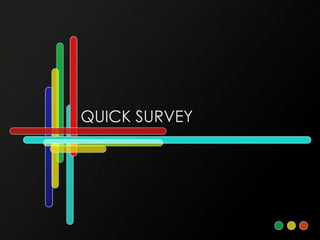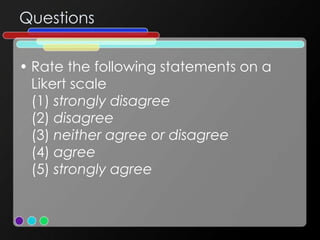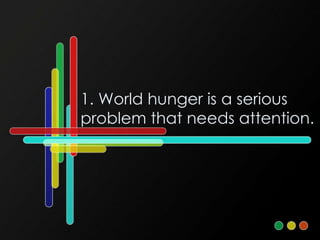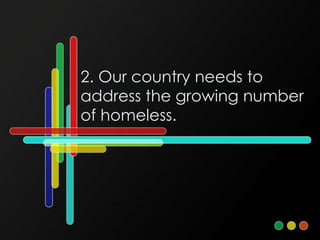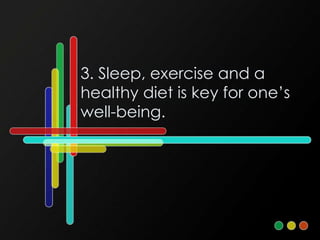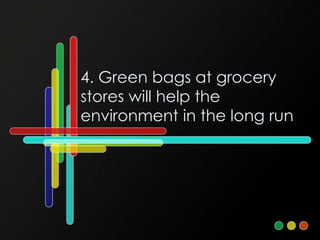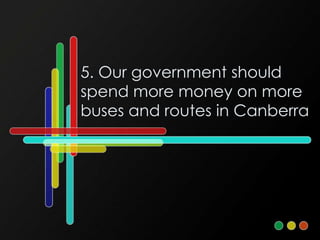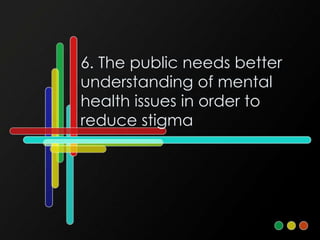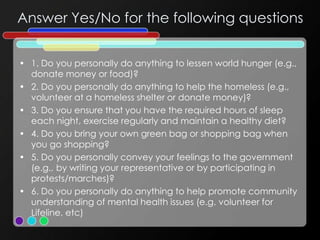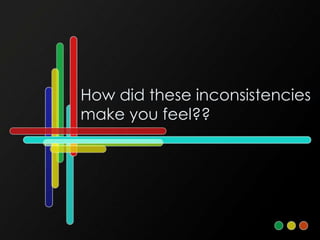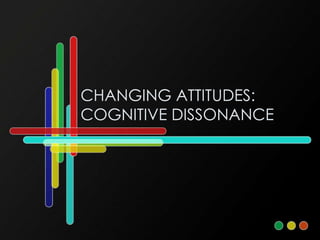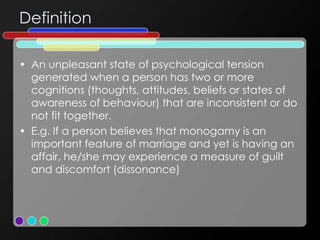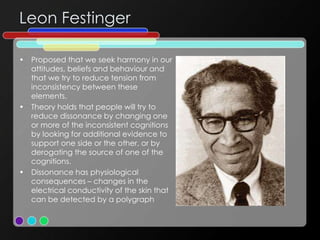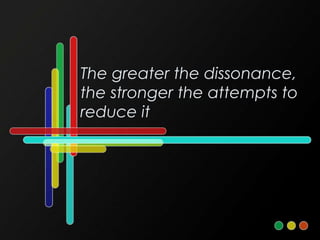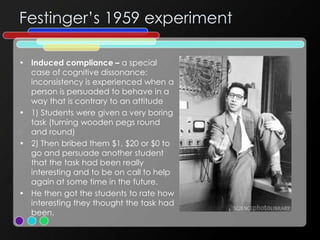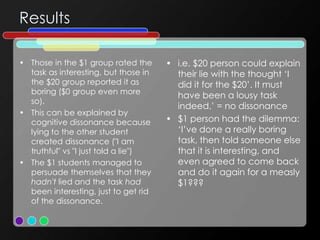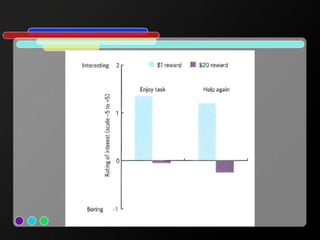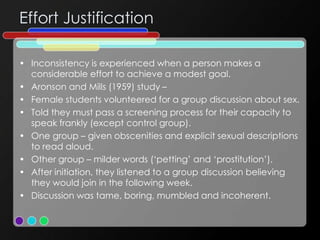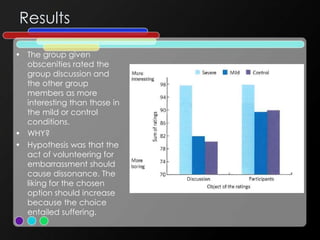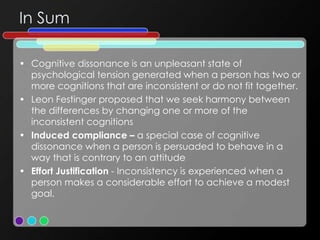Apl05 cognitive dissonance
- 1. QUICK SURVEY
- 2. Questions ÔÇó Rate the following statements on a Likert scale (1) strongly disagree (2) disagree (3) neither agree or disagree (4) agree (5) strongly agree
- 3. 1. World hunger is a serious problem that needs attention.
- 4. 2. Our country needs to address the growing number of homeless.
- 5. 3. Sleep, exercise and a healthy diet is key for oneÔÇÖs well-being.
- 6. 4. Green bags at grocery stores will help the environment in the long run
- 7. 5. Our government should spend more money on more buses and routes in Canberra
- 8. 6. The public needs better understanding of mental health issues in order to reduce stigma
- 9. Answer Yes/No for the following questions ÔÇó 1. Do you personally do anything to lessen world hunger (e.g., donate money or food)? ÔÇó 2. Do you personally do anything to help the homeless (e.g., volunteer at a homeless shelter or donate money)? ÔÇó 3. Do you ensure that you have the required hours of sleep each night, exercise regularly and maintain a healthy diet? ÔÇó 4. Do you bring your own green bag or shopping bag when you go shopping? ÔÇó 5. Do you personally convey your feelings to the government (e.g., by writing your representative or by participating in protests/marches)? ÔÇó 6. Do you personally do anything to help promote community understanding of mental health issues (e.g. volunteer for Lifeline, etc)
- 10. How did these inconsistencies make you feel??
- 12. Definition ÔÇó An unpleasant state of psychological tension generated when a person has two or more cognitions (thoughts, attitudes, beliefs or states of awareness of behaviour) that are inconsistent or do not fit together. ÔÇó E.g. If a person believes that monogamy is an important feature of marriage and yet is having an affair, he/she may experience a measure of guilt and discomfort (dissonance)
- 13. Leon Festinger ÔÇó Proposed that we seek harmony in our attitudes, beliefs and behaviour and that we try to reduce tension from inconsistency between these elements. ÔÇó Theory holds that people will try to reduce dissonance by changing one or more of the inconsistent cognitions by looking for additional evidence to support one side or the other, or by derogating the source of one of the cognitions. ÔÇó Dissonance has physiological consequences ÔÇô changes in the electrical conductivity of the skin that can be detected by a polygraph
- 14. The greater the dissonance, the stronger the attempts to reduce it
- 15. FestingerÔÇÖs 1959 experiment ÔÇó Induced compliance ÔÇô a special case of cognitive dissonance: inconsistency is experienced when a person is persuaded to behave in a way that is contrary to an attitude ÔÇó 1) Students were given a very boring task (turning wooden pegs round and round) ÔÇó 2) Then bribed them $1, $20 or $0 to go and persuade another student that the task had been really interesting and to be on call to help again at some time in the future. ÔÇó He then got the students to rate how interesting they thought the task had been.
- 16. Results ÔÇó Those in the $1 group rated the task as interesting, but those in the $20 group reported it as boring ($0 group even more so). ÔÇó This can be explained by cognitive dissonance because lying to the other student created dissonance ("I am truthful" vs "I just told a lie") ÔÇó The $1 students managed to persuade themselves that they hadn't lied and the task had been interesting, just to get rid of the dissonance. ÔÇó i.e. $20 person could explain their lie with the thought ÔÇÿI did it for the $20ÔÇÖ. It must have been a lousy task indeed.ÔÇÖ = no dissonance ÔÇó $1 person had the dilemma: ÔÇÿIÔÇÖve done a really boring task, then told someone else that it is interesting, and even agreed to come back and do it again for a measly $1???
- 18. Effort Justification ÔÇó Inconsistency is experienced when a person makes a considerable effort to achieve a modest goal. ÔÇó Aronson and Mills (1959) study ÔÇô ÔÇó Female students volunteered for a group discussion about sex. ÔÇó Told they must pass a screening process for their capacity to speak frankly (except control group). ÔÇó One group ÔÇô given obscenities and explicit sexual descriptions to read aloud. ÔÇó Other group ÔÇô milder words (ÔÇÿpettingÔÇÖ and ÔÇÿprostitutionÔÇÖ). ÔÇó After initiation, they listened to a group discussion believing they would join in the following week. ÔÇó Discussion was tame, boring, mumbled and incoherent.
- 19. Results ÔÇó The group given obscenities rated the group discussion and the other group members as more interesting than those in the mild or control conditions. ÔÇó WHY? ÔÇó Hypothesis was that the act of volunteering for embarrassment should cause dissonance. The liking for the chosen option should increase because the choice entailed suffering.
- 20. In Sum ÔÇó Cognitive dissonance is an unpleasant state of psychological tension generated when a person has two or more cognitions that are inconsistent or do not fit together. ÔÇó Leon Festinger proposed that we seek harmony between the differences by changing one or more of the inconsistent cognitions ÔÇó Induced compliance ÔÇô a special case of cognitive dissonance when a person is persuaded to behave in a way that is contrary to an attitude ÔÇó Effort Justification - Inconsistency is experienced when a person makes a considerable effort to achieve a modest goal.
